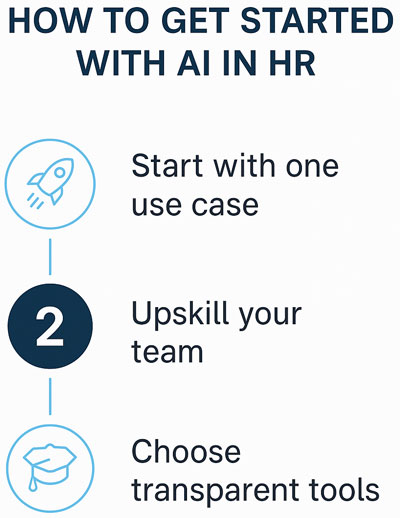Call us now:
In 2025, the real risk for HR leaders isn’t adopting AI it’s ignoring it. While fears about bias, automation, or loss of human touch persist, the reality is that AI is already central to recruitment, performance management, and employee support. Waiting means falling behind. In this article, I’ll explain why resisting AI in HR is no longer a safe or strategic position and how professionals can integrate it responsibly, without losing the “human” in human resources.

The Real State of AI in HR
AI is already reshaping the HR landscape what was once considered experimental is now part of daily operations in many companies. From CV screening and candidate matching to real-time support for employees, AI is now used to automate repetitive tasks and augment decision-making. According to recent surveys, 76% of HR leaders believe that adopting AI in the next 12–18 months is essential, and 38% have already begun integrating AI into their daily workflows.
Large organizations are leveraging AI to reduce administrative burdens, improve compliance, and deliver faster, more efficient HR services. For HR professionals, this isn’t just a tech upgrade it’s a strategic shift in how value is delivered to both the business and its people.
Three Key Areas Where AI Delivers Value in HR
🔍 1. Recruitment & Screening
AI can now handle resume screening in seconds, highlighting top candidates based on specific job requirements. This drastically reduces the time spent on the most repetitive part of recruitment initial sourcing. But AI doesn’t replace the human recruiter. Intuition, empathy, and human judgment remain essential in the final stages. What AI does is free recruiters to focus on the meaningful conversations and assessments that truly matter.
🤖 2. Employee Support & Experience
Well-designed AI chatbots and digital assistants now handle a large portion of routine employee requests: expense claim questions, holiday planning, payslip explanations, and more. This gives employees quick answers 24/7 while allowing HR teams to focus on more complex and sensitive issues. When a request requires a human touch, it’s seamlessly escalated to a live HR specialist.
📊 3. Strategic Insights & Decision Making
AI helps HR teams move from intuition-based decisions to data-driven insights. By analyzing performance, turnover trends, and engagement patterns, AI enables more accurate predictions and better interventions. HR is evolving from administrative support to a strategic business partner, and AI is a key enabler of that shift.
Addressing the Common Fears
It’s normal to have doubts about AI in HR. Questions like “What about bias?”, “Isn’t HR supposed to be human?”, or “Will AI make mistakes?” are all valid and they need to be addressed openly.
Here’s the reality: AI is not perfect. It can reflect bias if the data behind it is flawed. But so can human decisions. What matters is how we use AI with oversight, transparency, and ethical design. AI doesn’t remove the human side of HR it removes the repetitive noise so HR teams can focus more on people, not paperwork.
And yes, AI will make mistakes. But not using AI won’t eliminate mistakes it just hides them in outdated, inefficient processes.
Why Waiting Is the Bigger Risk
For HR leaders, waiting to adopt AI may feel like a safe option but in reality, being passive is not neutral it’s harmful. Here’s why:
⚡️ 1. You fall behind in speed and quality of hiring
AI enables faster shortlisting, proactive talent sourcing, and real-time communication with candidates. HR teams relying solely on manual processes simply can’t compete. While you’re still reviewing resumes, your competitors have already made the hire.
🛡️ 2. You increase your compliance and operational risks
AI flags inconsistencies, monitors compliance, and automates key documentation processes reducing human error. Without these tools, HR departments risk legal exposure and inefficiency.
💔 3. You risk employee dissatisfaction and higher turnover
Employees now expect instant, personalized support. AI helps HR meet those expectations. Teams that don’t evolve risk disengagement, poor communication, and increased attrition.
Bottom line?
Delaying AI adoption doesn’t preserve the status quo it creates competitive, legal, and human risks. The longer you wait, the harder it becomes to catch up.
How to Get Started with AI in HR
You don’t need to transform your HR function overnight. Here are three simple ways to begin integrating AI right now:
✅ 1. Start with one simple use case
Pick a time-consuming task like resume screening or responding to HR FAQs and automate it. AI tools today are modular and accessible, allowing you to start small and scale progressively.
📚 2. Invest in upskilling your HR team
Introduce basic AI literacy to your team. Help them understand the tools available, how to interpret data, and how to apply ethical decision-making when using technology.
🤝 3. Choose tools with transparency and human oversight
Opt for AI solutions that are explainable and auditable. Maintain human review processes for all critical decisions. AI should support HR not replace it.
Together, these steps allow HR leaders to move forward responsibly, with control and clarity.
Conclusion
AI is not a threat to HR it’s a tool that enables HR to become faster, smarter, and more impactful. The real danger isn’t in using AI it’s in not using it. While some professionals are still hesitating, others are already integrating AI to streamline operations, support employees, and make better decisions.
So here’s the truth:
Don’t fear being replaced by AI.
Fear being replaced by another HR expert who knows how to use it.
The future of HR isn’t about choosing between humans or machines it’s about blending the two to create smarter, fairer, and more strategic workplaces. If you want to stay relevant, competitive, and valuable in your field, the time to embrace AI is right now.
